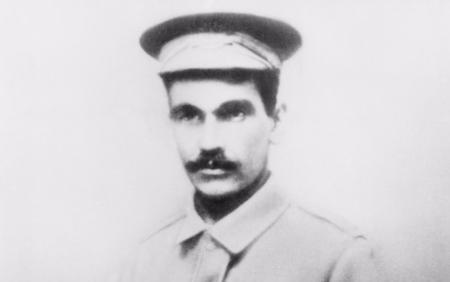A courageous soldier, Uncle Henry 'Harry' Thorpe was a Brabuwooloong man of the Gunaikurnai nation and an accomplished infantryman who served in World War I. Awarded the Military Medal for his bravery, he was killed in battle on 9 August 1918, just 3 months before the war's end.
Life on the family farm
Uncle Harry was born in 1886 at Lake Tyers Mission. He was the son of William and Lilian (née Wilson) Thorpe, both of the Gunaikurnai nation. His family lived on a 15-acre farm at Lakes Entrance. As a young man, Uncle Harry helped his father run the farm, growing crops and tending livestock.
Together, Uncle Harry and his father also secured contracts to dig graves, build fences and strip wattle bark for sale to local tanneries. They were respected members of the local community and admired for their work ethic. In his spare time, Uncle Harry trained as a hurdler and played football.
In 1905, he married Julia Scott, who was from Ramahyuck Mission at Lake Wellington. Uncle Harry built their house and in 1906 the couple's son Reg was born.


Volunteering for the Australian Imperial Force
In February 1916, Uncle Harry travelled to Sale on horseback and enlisted in the Army to fight in World War I. Uncle Harry left from Melbourne in April. He left from Melbourne in April and arrived on the Western Front in France in July 1916. His battalion faced heavy fighting at Pozières in France and within two weeks Uncle Harry was evacuated with a gunshot wound to his leg.
He was one of an estimated 800 to 1000 Aboriginal people who volunteered to enlist during World War I
After he recovered, Uncle Harry rejoined his unit and was promoted to lance corporal in early 1917. During the battle of Bullecourt in April that year, Uncle Harry was wounded in the shoulder, but returned to duty a month later. His injuries did not diminish his abilities as a footballer or as a scout, and within his unit he was noted for his skill at both.
Uncle Harry displayed tremendous courage and leadership
In October 1917, during operations to capture Broodseinde Ridge during the third battle of Ypres in Belgium, Uncle Harry displayed tremendous courage and leadership while clearing the dugouts and concrete guard posts, known as pillboxes, of remaining enemy resistance. He was promoted to corporal and awarded the Military Medal, although he was originally recommended for the Distinguished Conduct Medal. The military citation commended Uncle Harry's "disregard of all danger" and described him as an inspiration to his men.
The 7th Battalion went on to fight in the Flanders region in Belgium until they were moved to the Somme in France in mid-1918. During an advance on 9 August 1918 at Lihons Wood, south-west of Vauvillers, Uncle Harry was wounded in the stomach. He was found by a medical officer and taken on a stretcher to be treated, however he died shortly after.
Uncle Harry was 34 years old and was buried at Heath cemetery in Harbonnières, France.
Today, the name Uncle Harry Thorpe is inscribed on a memorial in Lakes Entrance, where a street called Thorpe's Lane is also named in his honour. For his family, Uncle Harry's is a story of courage that will never be forgotten.
Further Reading & Sources
